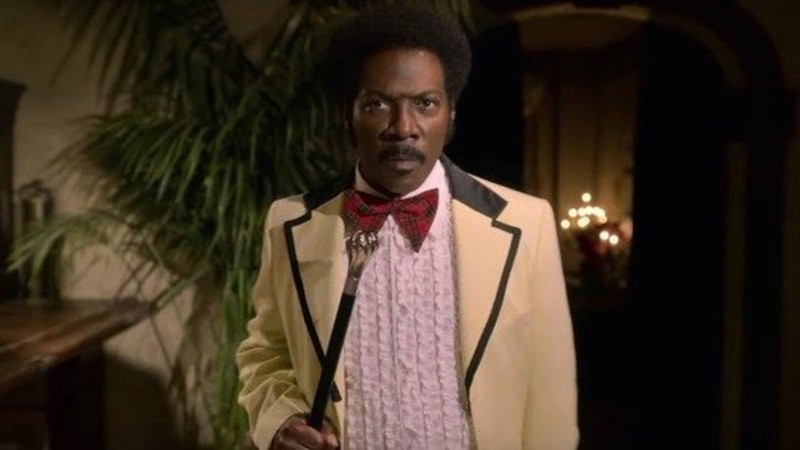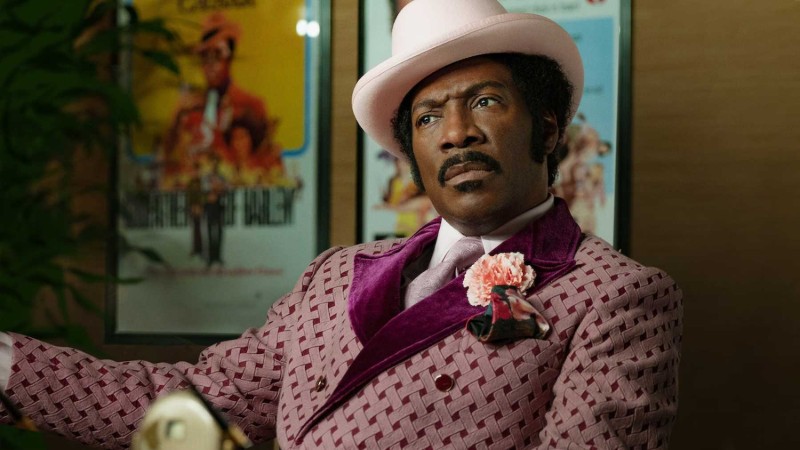




Rudy Ray Moore was a stand-up comedian, R&B singer and eventually movie star and film producer. He was also the star of blaxploitation classic Dolemite (D’Urville Martin, 1975). The titular character was the alter-ego he would adopt first on his comedy album Eat Out More Often. Due to the wild success of that album in the Black community and the smash success of other Blaxploitation films, he decided he should attempt to make a film based on his Dolemite character. Dolemite was a pimp who had “mastered” the art of kung fu.
Eddie Murphy portrays Rudy Ray Moore in a career-best performance. Murphy hasn’t been this good since Bowfinger (Frank Oz, 1999), another film about the quirks of low-budget filmmaking. Craig Brewer is credited as the director, and directs here with flare, but this is a perfect example of writer – or writers, in this case – as auteur. The screenwriting partnership of Scott Alexander and Larry Karaszewski has carved out a niche over the years since Ed Wood of making biopics about offbeat true stories, often with a showbiz twist , such as Andy Kaufman, Margaret Keane, Larry Flynt and the trial of O.J. Simpson. The elevator pitch here being “The Black Ed Wood“, and that’s a fair assessment, right up to an ending that recalls the final moments of Ed Wood. Eddie Murphy even sought out the screenwriting team, because he saw the clear parallels.

Murphy may be at the height of his powers here, but if anything, he gets upstaged by Wesley Snipes as D’Urville Martin who, like Murphy, has had a few rough years, including some prison time. Snipes is clearly having a ball portraying this hammy actor who took himself way too seriously, with a whiff of Camp for good measure. Martin would actually end up directing Dolemite in order to sweeten the offer of co-staring in the film. He would direct Disco 9000 a few years later, before he died young at only 45.
From the opening to the tune of Marvin Gaye’s Let’s Get It On through to the film’s final moments, it’s a just a joyful cinematic experience. The only huge issue with the film you could have is that Rudy Ray Moore was most likely gay, and although it’s hinted at in the film including a scene where he is noticeably uncomfortable filming a sex scene, no girlfriend to speak of, his friendship with the black and very openly gay producer Theodore Toney played by Tituss Burgess. I would presume a draft of the screenplay dealt with Rudy’s sexuality more explicitly, and although it’s not necessarily needed for the story that Murphy, Brewer, Alexander and Karaszewski are telling, it would’ve added a extra dimension to the portrayal of Rudy. The character of Dolemite is so over-the-top that he’s almost like a drag queen Superfly, so given the fact he was gay it would make Dolemite’s hyper-heterosexuality even that more hilarious.

The rest of the supporting cast is exceptional from Keegan-Michael Key as Jerry Jones, who would end up being the screenwriter of Dolemite and Rudy’s right-hand man during the production, to Kodi Smit-McPhee as Nicholas Josef von Sternberg (yes, the son of the noted director of the same name) who got his start as the cinematographer on Dolemite. Chris Rock has a fun cameo as a DJ, but one of the other big standouts is Da’Vine Joy Randolph, who gives it all as Lady Reed. Reed was one of the main female co-stars of many of Rudy Ray Moore’s films. She gives a lot of depth and heart to what could have been a thankless role.
This is one of the best films of the year, but perhaps just as importantly, and also one of the most entertaining. I just had a smile on my face during the film’s entire 118 running time. Everything from the script to the exceptional cast to the truly jaw-dropping costume work from Ruth E Carter and the needle-drops on the soundtrack were top-notch.
Dolemite is my Name is on Netflix on Friday, October 25th. It’s also showing in selected cinemas.





















